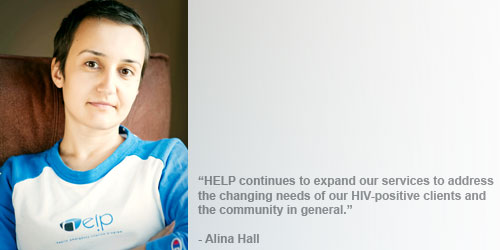by Jessica Carreras

Alina Hall is a registered dietitian who works with Health Emergency Lifeline Programs. The 34-year-old Belleville resident hopes to promote good health for HIV-positive people through proper diet and nutrition.
1 What exactly do you do for HELP?
I work in HELP's food and nutrition program as the registered dietitian. I assess clients' nutritional health, counsel and advocate on their behalf regarding food and nutrition issues.
In working at HELP, I've learned that our clients face numerous challenges related to their HIV status that impact their nutritional well-being. I discovered pretty quickly that I couldn't just be a dietitian; I couldn't develop diets on paper left and right and expect people to follow my recommendations. My clients don't just come in to talk about weight loss or weight gain; some of them struggle daily with side effects from medications and symptoms related to diabetes, heart disease, high blood pressure, etc. We talk through all these concerns, and I do my best to work with them, give them realistic tips on how to handle their symptoms and how to improve their lives nutritionally speaking.
There are times when I just find myself talking to them about personal issues because they feel safe – my co-workers tell me jokingly that I should get another degree in counseling. But I strongly believe that people's appetites, for example, are not going to improve if other things are not in place. They need a stable living environment; they need support from family, friends or community; and they need basic things that some of us take for granted such as a stove or a refrigerator. Until these are in place, very few good things happen. Typically at the end of our session, I determine if my client needs additional assistance from other programs at HELP and/or referrals for other health professionals.
2 How did you get involved in this line of work?
I have always been interested in nutrition and its impact on our health, so being a dietitian was something that I wanted to pursue for a long time. I graduated from Eastern Michigan University's Dietetics program, completed my internships, and was hoping for a job in the community. I saw the job posting at HELP and applied immediately. To be honest with you I didn't even think I would get the job! I felt prepared for it but did not have too much experience in the infectious disease area. Well … I did get hired, and am so excited about working with my clients, putting 110 percent into everything I do at my job. I think my clients feel that every time they step into my office!
3 How does your work help HIV-positive people?
Dietitians who work with HIV-positive people know how grueling the side effects of the medications can be on the body and how they can affect appetite, weight, image, self-esteem and so on. HIV meds can also have an impact on cholesterol, blood sugar and liver functions. Genetics make our job even more challenging as clients may be predisposed to develop certain conditions especially as they age.
It's common to have clients with weight issues who need to either gain weight or lose weight. For weight gain, I work with clients on how to increase their caloric intake in a healthy way without interfering with other problems. I may recommend supplements to give them that extra boost in calories. For people with weight loss goals, sometimes I have to fight against the "rapid weight loss" messages advertised on TV. I educate them on diets that work with their medical conditions and focus on long-term health benefits.
Sometimes I have to be creative in coaching clients about their eating habits. One of my favorite tools is a plastic model that I keep on my desk. It shows four stages of an artery, from healthy to clogged with plaque. Showing it to my clients always seems to get things moving in the right direction. Hopefully clients will also take good nutrition messages and habits home to their families and friends in the community.
4 What efforts is HELP currently making to expand?
HELP continues to expand our services to address the changing needs of our HIV-positive clients and the community in general. In addition to our food and nutrition program, we offer supportive services with housing and emergency financial needs. We provide medical case management, housing case management and mental health counseling. We are growing prevention and early intervention services to reach high risk and newly diagnosed people as well as to engage those who have dropped out of medical care.
5 What does your organization offer HIV-positive people that is unique?
HELP strives to be a one-stop shop for clients to address multiple needs. We offer a wide array of services under one roof. Our overall mission is to empower clients to live healthy and productive lives. We constantly keep this larger goal in mind and provide not just a service to resolve the immediate need, but focus on the bigger picture of having a positive impact in helping clients improve their overall quality of life.
Learn more at http://www.helpoffice.com










